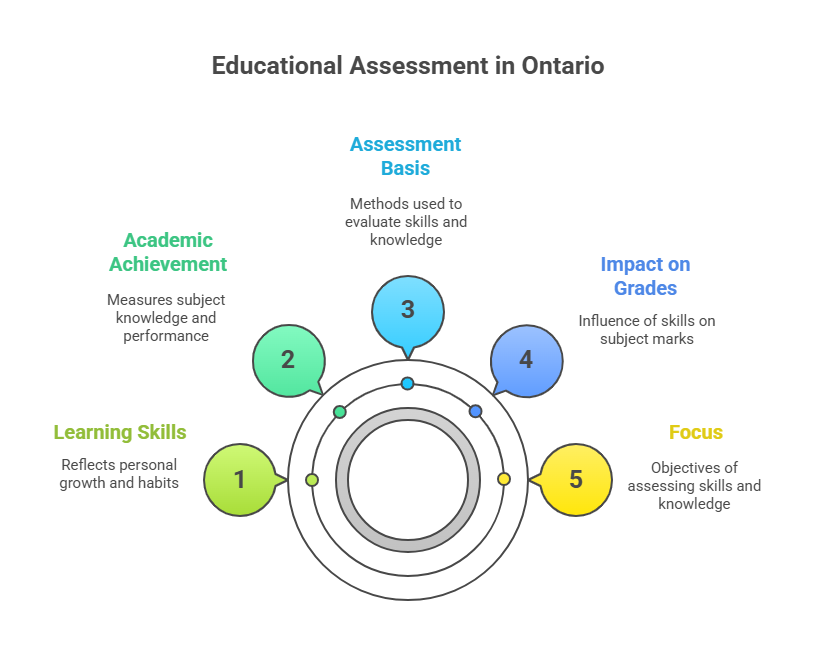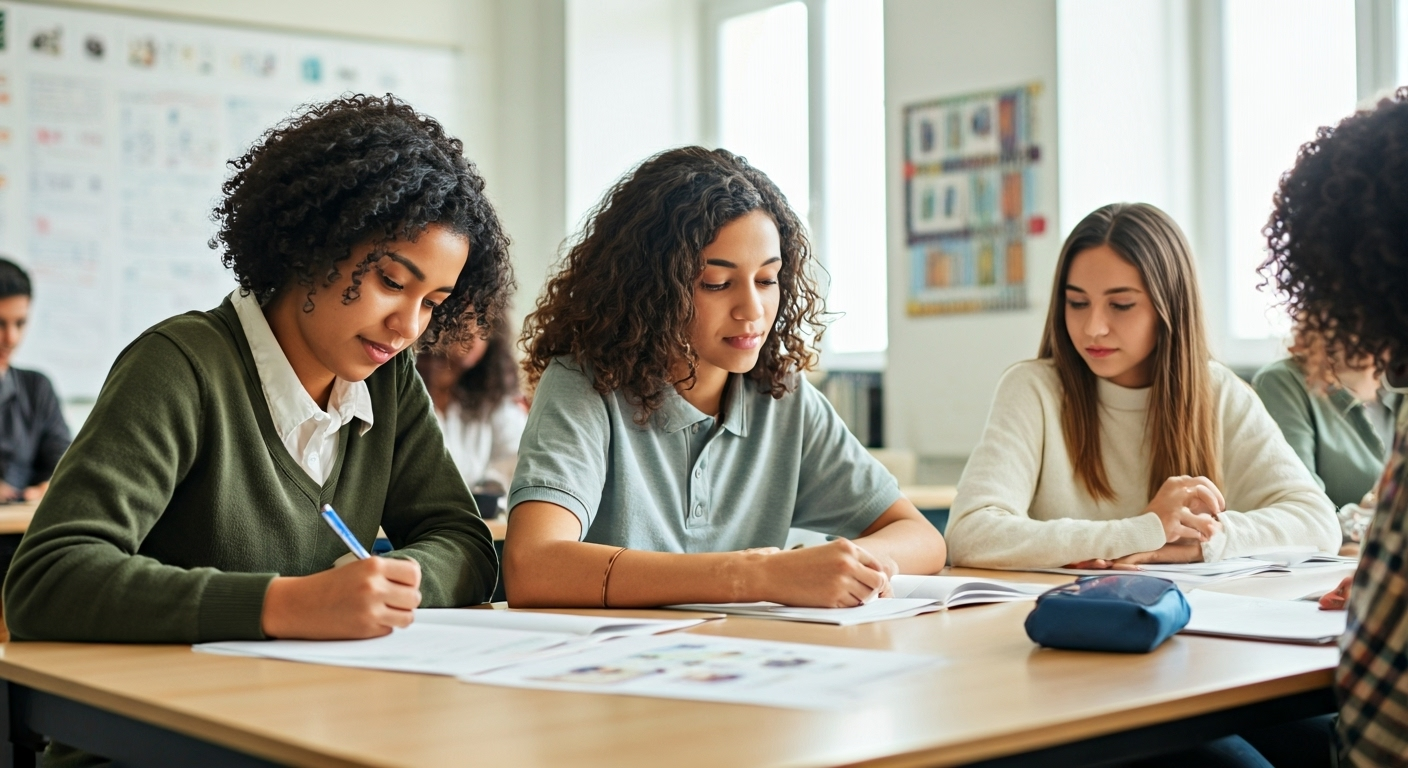Key Highlights of Learning Skills Ontario Report Card
- In Ontario, a report card shows how a student does in school. It gives marks for classroom work. The report card also has a work habits section that highlights six main learning skills.
- The learning skills in the work habits section are responsibility, organization, independent work, teamwork, taking initiative, and self-control. A child’s teacher checks how every student does with these skills at every level in the elementary grades.
- To see how students understand the curriculum, teachers use different methods. They make notes and comments for each student. These comments are meant just for the student and show how they learn best.
- The Ontario grading system keeps learning skills and subject marks separate. This way, families can see the areas of strength for their child and spot where a student can grow.
- It is good for parents, teachers, and kids to talk often. This helps everyone get better at building learning skills at home.
- Comments on a report card give you a view of how your child is doing. They also suggest ways you, your child’s teacher, and your family can all work together. This helps keep up good communication of learning and strong work habits for your child.
According to the Ontario Ministry of Education, learning skills are evaluated separately from subject grades
Introduction
Every Ontario Ministry of Education report card does more than give grades. It helps connect the Ontario curriculum with how schools, including USCA Academy, share the communication of learning with families. In Ontario, the report card gives a clear view of student strengths, learning skills, and how students do at school. It does not just show scores. These report cards talk about student achievement and work habits. This way, parents learn what their child knows and how they learn during the school year.
Understanding the Learning Skills on Ontario Report Cards
Ontario report cards talk a lot about learning skills, specifically focusing on the Ontario report card learning skills. These skills are the main part of how a student grows, and you will see them in the work habits section. The report card matches the Ontario curriculum, and every student in every grade will get checked on these learning skills.
Teachers watch students and see how they show the skills at different times and in different places. The report card tells what a student does well and what they could do better. This helps parents and teachers come together to help the student grow. To really understand learning skills, you should look at the six skills and read how Ontario talks about each one.
What Are the Six Learning Skills and Work Habits?
The six learning skills and work habits Ontario report cards help with student growth and success through life. These skills are checked in the work habits section. They help you see areas of strength and find where to get better. Here is a closer look:
Learning Skill & Work Habit | Definition & Focus |
|---|---|
Responsibility | Fulfilling commitments, completing tasks on time, and being accountable for actions |
Organization | Managing time, materials, and information effectively |
Independent Work | Working with minimal supervision and staying focused on tasks |
Collaboration | Cooperating with others and respecting diverse perspectives |
Initiative | Demonstrating curiosity, taking risks, and seeking new opportunities |
Self-Regulation | Managing emotions, setting goals, and monitoring progress |
In the table above, “Learning Skill & Work Habit” is the heading that you see at the top of the first column. It means that each skill that is listed there in the table is both a learning skill and a work habit. This is how it is shown and checked on report cards in Ontario.
These skills are checked from Grade 1 all the way to secondary school. Teachers watch for signs of each skill during class, in group projects, and in the tasks that come each day. For example, a student can show independent work by finishing tasks without reminders. A student can also show they are good at working together by helping the team in a positive way.
How Are Learning Skills Defined According to Ontario Guidelines?
Ontario’s “Growing Success” guidelines help school boards talk about learning skills and decide how teachers should grade them. The guidelines say teachers have to use the same words that are in the Ontario curriculum. Teachers are told to use a variety of strategies when they look at how students do their work. This way, the evaluation is fair and clear for everyone.
The guidelines say that checks on learning should be done often and in different ways. Students get more chances to show the skills they have, supporting the achievement of curriculum expectations. Teachers do not look at only test marks in the work habits section. They also watch things like how students take part in class, how they work with others, and what they say during talks. The point is to help students and parents see how much is being learned in the learning skills and work habits section. Teachers give feedback that helps students and parents learn what to do next. Because of this, learning skills are now a big part of what happens in schools in Ontario.
The Role and Importance of Learning Skills Assessment
Learning skills assessment is part of the Ontario report card in the elementary grades. This section shows how students work, including their development in social studies, and how they get along with other people over the year. It can impact the progress report card and may also affect the final grade. By looking at learning skills, teachers talk about more than just what students know in class.
They show how students’ habits and work in school, including subjects like social studies, connect to the curriculum. This helps everyone see what learning skills mean for each student’s everyday life and growth in school. It is important for students to understand this part of the report card, so they can keep getting better every year.
Why Learning Skills Matter for Student Success
Learning skills are very important. They help shape how students learn and what results they get later. The way students use learning skills works with what they know in class. It helps get them ready for life after school. When students show good learning skills, like taking charge and managing their own work, they do better with tasks. These skills help them get used to change and keep going when things get hard.
The right learning skills can help students reach higher levels of achievement. They feel better about being at school, too. When students get better at these skills, they often see a good boost in their final grade and on their report cards. Michael Fullan, a well-known education expert, says, “Skills like working together and self-control are the backbone of lifelong success.” When students practice learning skills early in the school year, they start good habits. These habits help them do well in student learning both now and later on.
Differences Between Learning Skills Evaluation and Academic Achievement

In Ontario, report cards show both your learning skills and your grades in school. These two things are not the same. The grades are about how well you do in subjects like math, science, or language. Learning skills tell about your work habits and how you grow as a person.
Key differences include:
- Assessment Basis: The school looks at your learning skills by watching how you act and if you take part in things at school. Your grades for subjects are given when you hand in your work and take tests.
- Impact on Grades: You will find learning skills in their own part on the report card. They do not change the marks you get for any of your subjects.
- Focus: Your grades show what you know from the subjects you study. Learning skills show how you behave and feel about learning during the school year.
This way the Ontario grading system gives families clear and useful information. You get to see how your student learning is going. You also understand what your strengths are and what next steps you can take. The Ontario grading system shows how you are improving as a learner in Ontario.
Grading and Reporting Learning Skills in Ontario Schools
Ontario schools use a clear way to grade learning skills. You will see this way in both elementary report cards and in the secondary school report card Ontario format. Teachers use proof from all year, including assessments conducted in October. They look at what is recent and focus on steady work too.
In the work habits section, you will see grades along with feedback made just for you. The feedback tells you what your strong points are. It lets you know what you can do to get better at other things. The reports in secondary school might not look like the ones in elementary school. Even so, the goal of good communication of learning stays the same in all places.
How Teachers Evaluate and Grade Learning Skills
Teachers in Ontario, such as those at USCA Academy, use many ways to see how students are doing with their learning skills for the final report card. They watch students in class, talk with them, check student work, and notice what happens in group activities. In kindergarten, the kindergarten communication of learning process talks about learning through stories in the feedback given to families. In elementary and secondary school, teachers use ratings and write comments to explain the report card and the results.
Teachers, like the ones at USCA Academy, check how often and how well students show the six learning skills. They do not just use old scores. Instead, they look at the most recent and best information. In secondary school, things are mostly the same. But teachers there also help students think about their learning and get ready for what comes after they finish secondary school. The main goal is to give parents and students a clear and useful report that shows their growth, skills, and what they have achieved.
Reporting Processes for Elementary vs. Secondary Levels
Ontario has changed how it looks at learning skills as students grow older. On the elementary school report card Ontario, teachers use letter grades to show how students in Grades 1 to 6 are doing. This is for things like learning skills. When students get to Grades 7 and 8, teachers use percentage marks instead on the provincial report card. For both groups, teachers add comments with the report card to help explain what the grades mean. Ontario wants to make sure there is good talk happening between home and school.
For the secondary report templates, the main goal is to help students prepare for life after they finish school. Learning skills are still part of these reports. Comments now highlight how students are starting to make their own choices and plan for what comes next.
Key differences:
- Elementary: The report card shows the areas of strength for students and gives clear next steps they can work on.
- Secondary: These report card comments linked to the students’ semester plans for after high school get students to think more about themselves and what they want to do.
- Grade-specific templates: The report card style goes along with the student’s age and what the school expects at that grade level.
As explained in “Growing Success,” these changes make sure that student learning is helped at every step. The way learning skills are shared on each provincial report card helps students get what they need as they move forward.
Parent Tips and Best Practices for Supporting Learning Skills
Parents have a big role in helping kids build learning skills at home. Talk often with your child’s teacher about what is going on. Look at the comments in the report card carefully. You need to focus on your child’s areas of strength and help them grow in those things. The communication of learning does not just happen at school—it is at home too. Families can use a variety of strategies to help build good work habits and push kids to do their best every day. It is important to know how to read the Ontario report card. Use the tips it gives, and take action, so your child can keep getting better over the year.
How Parents Can Help Build Learning Skills at Home
Helping your child grow good learning skills needs help from both you and the school. Parents should read tips in the kindergarten addendum and look at the first report card to support learning at home. Try these ideas to help:
- Make plans for homework and staying organized. You can use things like checklists or planners to help with this.
- Let your child practice independent work by giving them small goals to reach. Give praise when they meet each one.
- Show how to work together and be a leader by doing tasks at home with your child.
Teachers in Ontario share a variety of strategies to help your child. They say you should talk with your child about what is hard for them and what is going well. John Malloy, who used to be an education director, says to keep daily routines at home. It helps kids use the same learning skills they use in school. If you get involved and stay positive, you help your child learn good habits that they can use all through the school year, not just in kindergarten. Keep working as a team, and use each report card to find the best way to help your child grow.
Communicating with Teachers and Reading Report Card Comments
Talking to your child’s teacher helps you know what the report card says. This is important for parents in Ontario who read report card comments Ontario teachers write. Here is how you can learn more from this and help your child:
- Go over the report card together. Point out the good things and also any parts that need help.
- Ask the teacher clear questions about the work habits section. Find out how your child can do better in this part.
- Let the comments help you start a talk about setting goals for the next term.
Good report card comments often include real examples. For example, “Your child shows initiative by offering to help with classroom tasks,” or, “Needs improvement in organization—reminders to use a daily planner could help.” This helps people know what to do with the feedback. When families and teachers in Ontario work together and talk a lot, they help the communication of learning both at home and at school. It makes everyone work as a team for your child’s progress.
Conclusion
To sum up, it is important for parents to know about the Learning Skills Ontario Report Card. This will help you give your child good support at school and at home. When you understand the six main learning skills and see how they are not the same as normal grades, you can help your child get better at learning. Good talks with teachers and looking at the report card notes together can help everyone work as a team.
By putting learning skills first, you help your child do well now and also make good learning habits for later. If you want to know more about helping your child grow with their report card and learning skills in Ontario, you can get a free talk with our education experts at USCA Academy today!
Frequently Asked Questions
1. What do teachers mean by “Needs Improvement” in learning skills comments?
“Needs Improvement” in the report card comments Ontario means that a student needs more help in some areas of strength. This can be with things like organization or independent work. It shows that the student may have some habits that do not always match the goals in the work habits section of the Ontario Ministry of Education report card. These report card comments Ontario help teachers and parents see if the student is having trouble with the right work habits. If you read this on a report card, it is a good step to talk about ways to help the student. The goal is to help them get better with independent work and other skills.
2. Where can I find sample templates or checklists for learning skills?
Sample secondary report templates, checklists, and guides to help you check learning skills are shared by school boards. These tools are often sent to parents with the first provincial report card. If you want more samples or want to read the report card comments Ontario teachers use, you can ask your child’s teacher or visit the school’s website.
3. How do ‘Growing Success’ guidelines impact learning skills assessment?
“Growing Success” helps teachers in Ontario check how students are doing in class. It makes sure the way they check matches the Ontario curriculum. When teachers fill out a report card for each elementary student, they use regular check-ins to watch student learning. They also try different methods to look at how kids learn. This helps teachers show how learning skills and school progress are doing in a clear and fair way.









